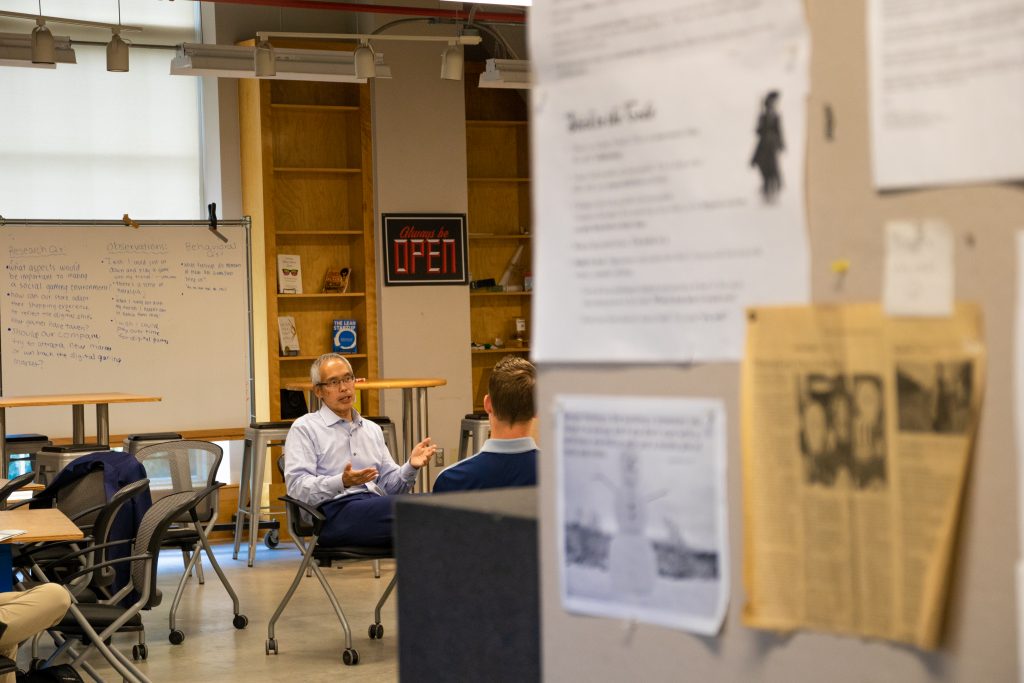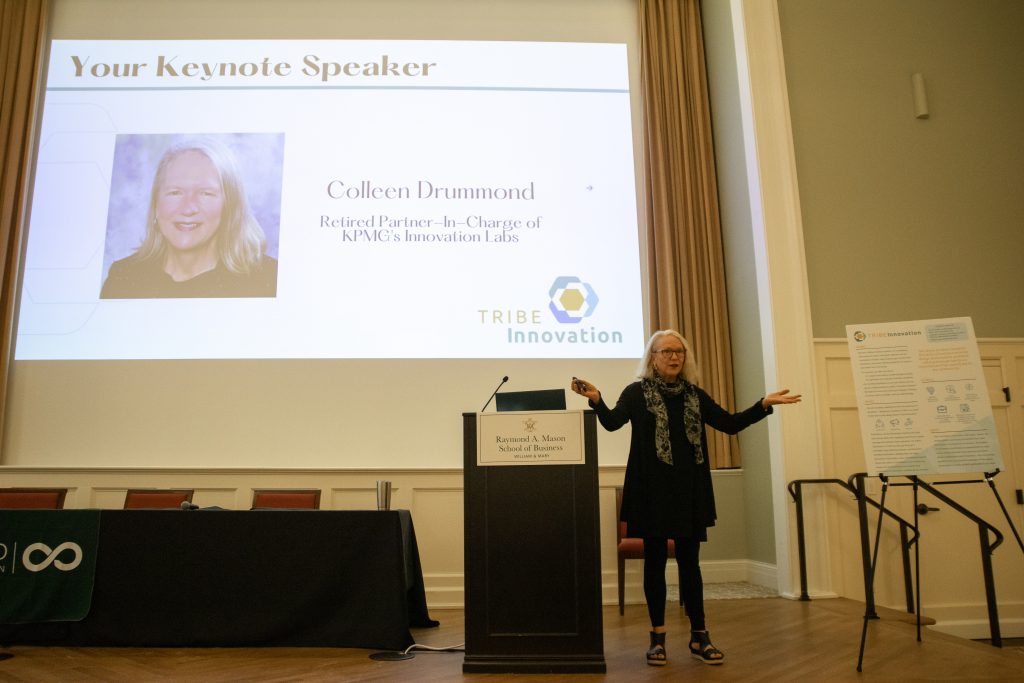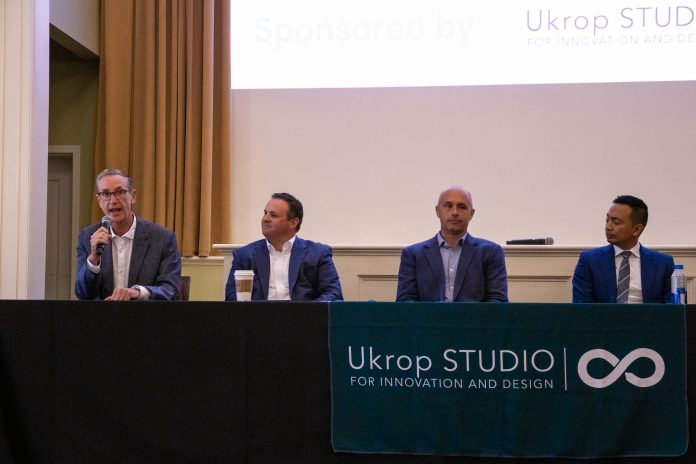Friday, Sept. 30, Tribe Innovation hosted their Innovation at Work panel at the Raymond A. Mason School of Business. After pandemic complications and a snowstorm caused two delays, the event finally took place and featured five panelists, Clement Chen, Dan Webber, Eric Van Geison, Wynn Thane and Matt Williams, alongside keynote speaker Colleen Drummond. Speakers highlighted how change brought about the need for greater innovation and leadership, covering a spectrum of fields from marketing to healthcare to epigenetic developments.
Mason School of Business Dean Todd Mooradian opened the event by speaking about the importance of adapting business analytics to new creative understandings of the arts and sciences.
“We augmented our business paradigm with paradigms from the arts and sciences,” Mooradian said. “We study how people come together to change the world.”
Tribe Innovation President Anna Hoskins ’23 continued with an explanation of the Tribe Innovation team and events. The organization hosts Innovation Sprints, which cultivate new suggestions and ideas with open-forum whiteboards and post-it notes for all students to contribute commentary. They also host workshops for various campus wide organizations, including Student Affairs; Hoskins highlighted Tribe Innovation’s partnership in creating Student Affairs’ five year plan.
Clement Chen M.B.A ’90, Vice President of Leidos’s Health and Human Services group, opened the panel speaking about the need for innovation, particularly with the healthcare system.
“The system of our healthcare is broken,” Chen said. “In order to disrupt that, it’s going to require bold moves, creative moves.”
Chen was also vice president of business innovation for Lockheed Martin and a graduate of the Raymond A. Mason School of Business MBA program.
Wynn Thane, director of Guidehouse’s National Security Group and co-chair of the US Geospatial Intelligence Foundation’s Machine Learning and Artificial Intelligence Working Group, emphasized the importance of practically adopting ideas and adapting proposals to different audiences.

“Innovation has the potential for drastic and significant change,” Thane said. “From a leadership perspective, I think it’s great for leaders to have a healthy dose of thinking outside the box… of being open to new ideas, and to implement new ideas.”
“Innovation has the potential for drastic and significant change. From a leadership perspective, I think it’s great for leaders to have a healthy dose of thinking outside the box… of being open to new ideas, and to implement new ideas.”
Former Defense Advanced Research Projects Agency Program Manager Eric Van Gieson spoke about the importance of innovation quickly to save lives. He specifically mentioned DNA and RNA research that was initiated long before 2020 and greatly accelerated the development of the mRNA vaccine for COVID-19. Now, Gieson serves as a commercial consultant for various DARPA investments, such as epigenetic research.
“You had to be innovative before the threat even existed,” he said.“We took an idea that seemed ridiculous and impossible and turned it into something commercially possible.”
President of Edelman’s Washington D.C. office Dan Webber ’02 emphasized trust, effort and constant curiosity.
“Innovation isn’t a short term thing. Trust is looking out onto the horizon.”
“Innovation isn’t a short term thing. Trust is looking out onto the horizon,” Webber said.
When asked about advice for college students, he suggested three key activities for students to partake in: improv, art and psychology.
“You learn to think differently and on the fly, and most importantly not on your own but building off your team,” Webber said.
Webber is also a proud alumnus of the College, and an adjunct professor in Georgetown University’s School of Continuing Studies.
Matt Williams ’89, managing partner at Brand Federation, former CEO of the Martin Agency and visiting clinical professor of marketing at the Mason School of Business, highlighted the importance of failure.
“To be innovative, you have to give yourself permission to fail, and you have to be in a place that allows you to do that,” Williams said. “What separates us from the rest of the world… is not knowing what no one else knows… it’s seeing what no one else has seen.”
“To be innovative, you have to give yourself permission to fail, and you have to be in a place that allows you to do that.”
Keynote speaker and retired partner for KPMG Colleen Drummond closed the event with some key advice for the audience.
“Often when people think of innovation they think of products, but it’s a lot more than that,” Drummond said.

She also strongly endorsed the Innovation and Entrepreneurship minor offered at the College, highlighting how it teaches key business and design concepts and vocabulary that could apply to any field.
Bringing so many speakers together and coordinating the event was no small feat; Tribe Innovation initially launched the project two years ago before being delayed by a snowstorm in February 2020 and canceled due to COVID in April. But, strong connections to alumni as well as detailed planning by team members such as Dorothy Gao ’24 and Rohit Vadodaria helped bring the three hour long session together.
“Our school has such a strong network to help us bring so many alumni back to the College, and to see how many alumnis are in diverse backgrounds and diverse experiences and are all willing to help us,” Gao said.
The event brought together insightful innovators from a wide variety of professions to inspire professors and students, including Spencer Hutchens ’24.
“One big takeaway I had from this session was that change, specifically innovation, isn’t always what you think it is,” Hutchens said. “Innovation isn’t always just product development, making better and better products. It’s also systems innovation, a completely different way of doing something.”
CORRECTION (10/18/22): Article was updated by the Standards and Practices Editor to highlight the work of Rohit Vadodaria in the event. It should be noted that he secured all six panelists, coordinated all logistics, and managed countless other responsibilities to make the event possible.

